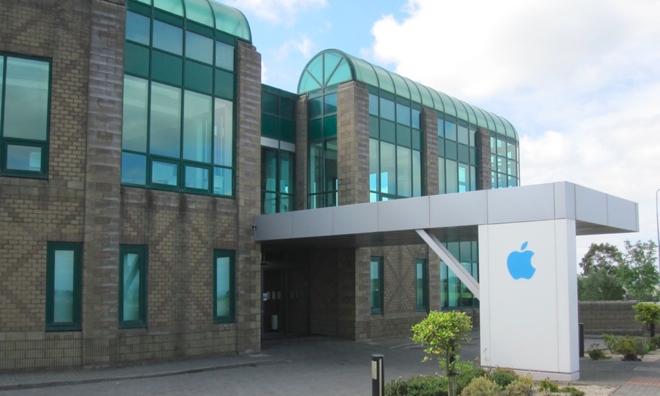Apple may once again come under the spotlight over taxes, as the iPhone maker's latest filings reveal that it paid no corporate taxes in the United Kingdom last year, despite having pulled in billions of dollars from its European operations.
Headquarters of Apple Sales International in Ireland, which handles most of Apple's overseas revenue.
Deductions from share awards to employees essentially negated Apple's corporate tax liabilities in the UK through September of last year, The Financial Times reported this week. Apple's U.K. subsidiaries — Apple (U.K.), Apple Europe, and Apple Retail U.K. — reported pre-tax profits of £68 million in the year through September 2012, with some £27.7 million in taxes deducted due to
Apple's sales in the United Kingdom accounted for less than 10 percent of its overall sales.
The California based company's European operations pulled in $36.3 billion in net sales to European customers in 2012. Of that, Apple reported that $15 billion was operating profit.
Those European sales, along with Apple's other international operations, make up nearly two-thirds of the company's revenue. Much of that revenue is routed through Apple Sales International, an Irish subsidiary that — due to Ireland's tax structure — is not listed as a tax resident anywhere. That status allows Apple to pay just 0.05 percent in taxes in Ireland, a rate that contributes greatly to the company's massive profitability.
Apple has recently come under fire in the U.S. and abroad for what many have called tax avoidance. Most recently, Apple chief Tim Cook and a number of other Apple executives were called to testify before a Senate subcommittee to defend the low tax rate Apple pays on its overseas earnings. Cook maintained that Apple had done nothing wrong.
"We pay all of the taxes we owe," Cook said, "every single dollar. We not only comply with the laws, but we comply with the spirit of the laws."
The new U.K. tax revelation is not the first time Apple has garnered scrutiny due to its tax practices in that country. Last year, a British report found that basing its operations out of Ireland allows Apple to pay about half the U.K, taxes it would otherwise. A similar report from Spain's El PaÃs showed that Apple had routed 99 percent of its Spanish sales through its Irish subsidiary. That allowed Apple to pay about 2.6 million euros in taxes for the yeari in Spain, even though sales at Spanish Apple Stores were up 86 percent.
 Kevin Bostic
Kevin Bostic



-xl-m.jpg)



-m.jpg)






 Malcolm Owen
Malcolm Owen
 Chip Loder
Chip Loder
 Christine McKee
Christine McKee
 William Gallagher
William Gallagher
 Amber Neely
Amber Neely

 Andrew Orr
Andrew Orr



-m.jpg)






95 Comments
I hope the UK powers that be are checking into Google, Microsoft, etc. etc. etc .... :no:
So Apple paid employees using stock awards to offset taxes. Sounds like good financial planning to me. It puts money in the hands of the people who sold Apple products instead of in the hands of greedy politicians. Of course, this type of income also requires the recipient to pay income taxes so Apple is simply passing on the tax liability to its employees. If this is legally allowed, then why are we complaining about it?
Waiting for the liberal freetards to come out of the woodwork and whine about Apple (but not Google, Microsoft, Intel, etc..) not paying any taxes that they legally did not have to pay, and fully approved by the government in which the brouhaha is occurring.
I hope the UK powers that be are checking into Google, Microsoft, etc. etc. etc ....
They are actually. Google, Amazon and Starbucks have all been hauled in front of parliamentary committees recently over this exact same issue, so this isn't picking on Apple.
The issue is the Irish tax setup. The Irish government says corporations incorporated in Ireland pay tax on where they're managed and controlled from (for Apple, this is the U.S.) but US rules (and most other major economies) say the tax should be paid where the company is incorporated. If Ireland got in line with everyone else, a lot of this would go away.
This is not accurate. When you buy an Apple product in the UK, you pay a VAT of %20. This is a huge amount of money on a MacBook Pro! The government collects its taxes at sales time. The UK government has made a lot of money from Apple. Further, since Apple made use of tax writeoffs for employee compensation, and the government taxes the employees income, the government collected taxes there. For Apple to have paid taxes on that, and then the employee pays taxes on that would be double dipping-- something governments really like to do. Taxes are theft. This is indisputable objective reality. I look forward to the AppleInsider article "Apple, once again, doesn't have $4B in product stolen by thieves!"